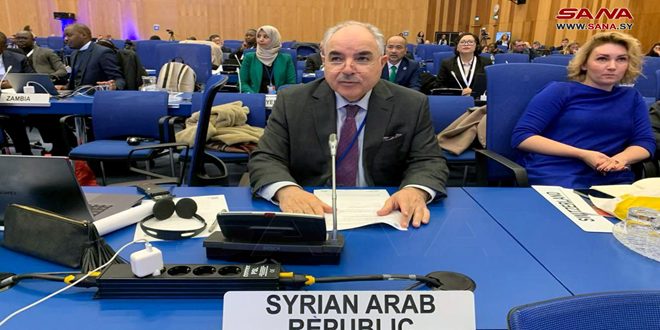Ambassador Khaddour: The terrorist and economic war on Syria left disastrous effects on the industrial sector
Ambassador Khaddour pointed out that “the industrial sector in Syria suffered great losses as a result of the war, as the industrial sector ranked second in terms of the destruction caused by the war following the losses of the residential sector.” He explained that “70 percent of Syria’s industrial capacity has been completely destroyed, whether through the targeting by terrorists who stole factories, or through cases of stealth of production supplies and smuggling them to some neighboring countries, the value of which is estimated at about 60 billion dollars, in addition to the loss of about a million job opportunities due to the destruction in industry, agriculture, trade, and services sectors.”
Ambassador Khaddour stated that “the number of damaged private establishments that were counted in Damascus and its countryside, Aleppo, Hama and Homs amounted to about 4,200 establishments, and as for the public industrial sector, the crisis led to the exit of 49 companies, factories and gins from production”. He added: “What Syria needs to restore the wheel of industrial production to what it was before the war, has been estimated at about $210 billion at least.”
He said: “The Syrian delegation took note of the Director-General’s report on UNIDO’s activities related to cooperation with middle-income countries, and is following up on the progress made in implementing the two country partnership programs, and it is looking forward to increasing the number of countries that wish to benefit from the country partnership programs.” He indicated that cooperation which took place between the government of the Syrian Arab Republic and the Organization, has resulted in the launch of the pioneer project to revitalize the agricultural food industries sector in Syria on the 10th of last May, as the first development project since 2011.
He said that the Syrian delegation welcomes the United Arab Emirates’ hosting of the United Nations Framework Convention on Climate Change (COP28) Conference. He also expressed his support for the offer made by the Kingdom of Saudi Arabia to host the twenty-first session of the General Conference of the United Nations Industrial Development Organization in the city of Riyadh in 2025.
Syria’s permanent representative to the United Nations Office and other international organizations in Vienna added: “The government of the Syrian Arab Republic looks forward to establishing fair global partnerships based on respect for the principles of international law and the provisions of the United Nations Charter, in order to support the efforts of Syrian state institutions to overcome all the challenges imposed by the years of war of terrorism imposed on the country, and thus achieve the sustainable development goals.”
In addition, Ambassador Khaddour reaffirmed Syria’s position that calls for an immediate cessation of the Israeli aggression against Gaza and the provision of urgent humanitarian support to the Palestinian people. In this respect, he said: “The Syrian Arab Republic condemns in the strongest terms the brutal Israeli practices against the Palestinian people in the occupied territories, especially in Gaza Strip, including indiscriminate bombing and killing of innocent civilians, as well as the systematic targeting of hospitals and industrial infrastructure in the Strip.”
Ambassador Khaddour stressed that what “Israel” seeks to do by committing genocide crimes against the Palestinian people comes as part of an ongoing series of aggression against the Palestinian people so as to displace them from their land, change the demographic character, and liquidate the Palestinian cause, in a flagrant violation of international humanitarian law.
Ambassador Khaddour stated that what “Israel” is doing in Gaza is part of the nature of this occupation, which has never ceased its aggression against other countries. Two days ago, “Israel” launched an aggression against Damascus International Airport, which is a Syrian civilian facility whose primary goal is to serve citizens. This aggression is linked to the brutal aggression against the Gaza Strip, which is a war crime and a crime against humanity.
Ambassador Khaddour stressed that “this attack on Syrian civilian airports constitutes a threat to peace and security in the region and the world, and a flagrant violation of international resolutions.”

